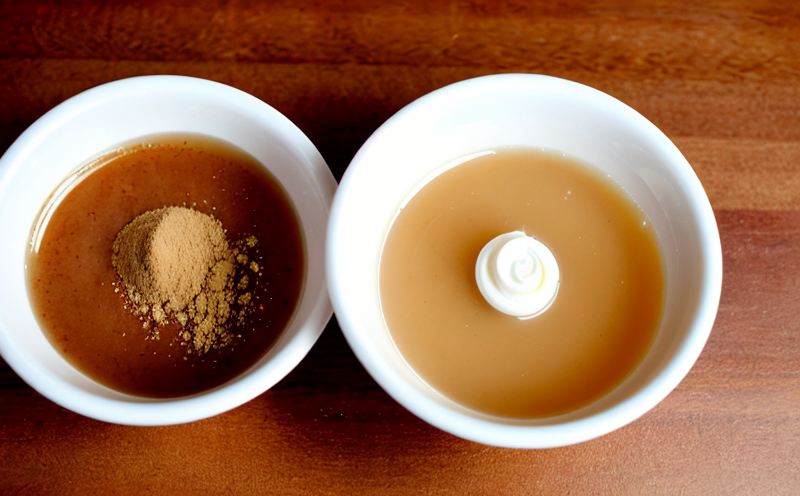BS EN 15763 Sweetener and Preservative Testing by Chromatography
The British Standard (BS) EN 15763 specifies a comprehensive set of methods for the analysis of sweeteners and preservatives in food products using high-performance liquid chromatography (HPLC). This service is particularly relevant for quality managers, compliance officers, R&D engineers, and procurement teams tasked with ensuring product safety, efficacy, and regulatory compliance.
Sweetener testing involves identifying and quantifying various types of sweeteners such as sucralose, aspartame, and acesulfame-K. These sweeteners are often used in food and beverage products to enhance taste while reducing sugar content. Accurate quantification is crucial for maintaining product quality and ensuring compliance with labeling regulations.
Preservative testing focuses on identifying and measuring preservatives like benzoic acid, sorbic acid, and parabens that extend the shelf life of food products by inhibiting microbial growth. The presence or absence of these compounds must be determined to ensure they are present at safe levels as stipulated by regulatory bodies.
The HPLC technique used in this testing ensures high precision and accuracy. It involves a series of steps starting with proper sample preparation, followed by the injection of the prepared samples into the chromatography system. The separation process allows for clear identification of different compounds based on their retention times.
Our laboratory adheres strictly to BS EN 15763 guidelines to ensure reliable and repeatable results. This includes using certified reference materials (CRMs) for calibration, employing experienced analysts who are trained in the use of HPLC equipment, and maintaining meticulously documented procedures throughout each stage of the testing process.
The service also encompasses validation studies that demonstrate compliance with international standards such as ISO 17025. These validations ensure the reliability of our results under various conditions and help build trust within the industry.
By leveraging BS EN 15763 sweetener and preservative testing, clients can gain confidence in their product quality assurance processes. This not only aids in maintaining brand reputation but also helps comply with stringent regulatory requirements across different markets.
Applied Standards
The service is aligned with BS EN 15763 which provides detailed procedures for analyzing sweeteners and preservatives using HPLC. This standard ensures consistent testing methods that are recognized globally, providing a robust framework for achieving accurate results.
In addition to the primary standard, other relevant international standards include ISO 14698 for the general principles of chromatographic analysis in food science, and ASTM E1530 which covers sample preparation techniques. These additional standards complement BS EN 15763 by offering supplementary guidance on various aspects of sweetener and preservative testing.
Our commitment to adhering strictly to these standards guarantees that our results are not only precise but also internationally accepted, enhancing the credibility of your product in both domestic and export markets.
Scope and Methodology
The scope of this service includes detailed analysis of sweetener types such as sucralose, aspartame, acesulfame-K, and other similar compounds. Preservatives like benzoic acid, sorbic acid, and parabens are also analyzed to ensure they meet safety thresholds set forth by regulatory authorities.
The methodology involves several key steps:
- Sample collection and preservation
- Preparation of samples for HPLC analysis including dilution where necessary
- Injection into the HPLC system followed by separation based on retention time
- Detection and quantification using appropriate detectors like UV-visible or mass spectrometry
- Post-processing data interpretation to generate final results reports
This rigorous approach ensures that every aspect of sweetener and preservative presence is accounted for, providing comprehensive insights into product composition.
International Acceptance and Recognition
- Certified Compliance: Results from this service are recognized by regulatory bodies worldwide ensuring compliance with international standards.
- Global Market Access: Products tested meet stringent requirements, facilitating smoother entry into diverse markets.
- Reputation Enhancement: Positive outcomes boost brand image among consumers and stakeholders alike.
- Customer Satisfaction: Reliable data contributes to higher customer satisfaction levels through consistently high-quality products.
- Competitive Edge: Superior quality assurance gives businesses a competitive advantage in the marketplace.
- Regulatory Assurance: Compliance with international standards reduces risks associated with non-compliance penalties.
- Innovation Support: Detailed analysis supports ongoing research and development efforts aimed at improving product formulations.
The acceptance of these results by global markets underscores the importance placed on maintaining high quality standards in food products. This service not only enhances your business operations but also strengthens trust among customers and regulatory authorities alike.





